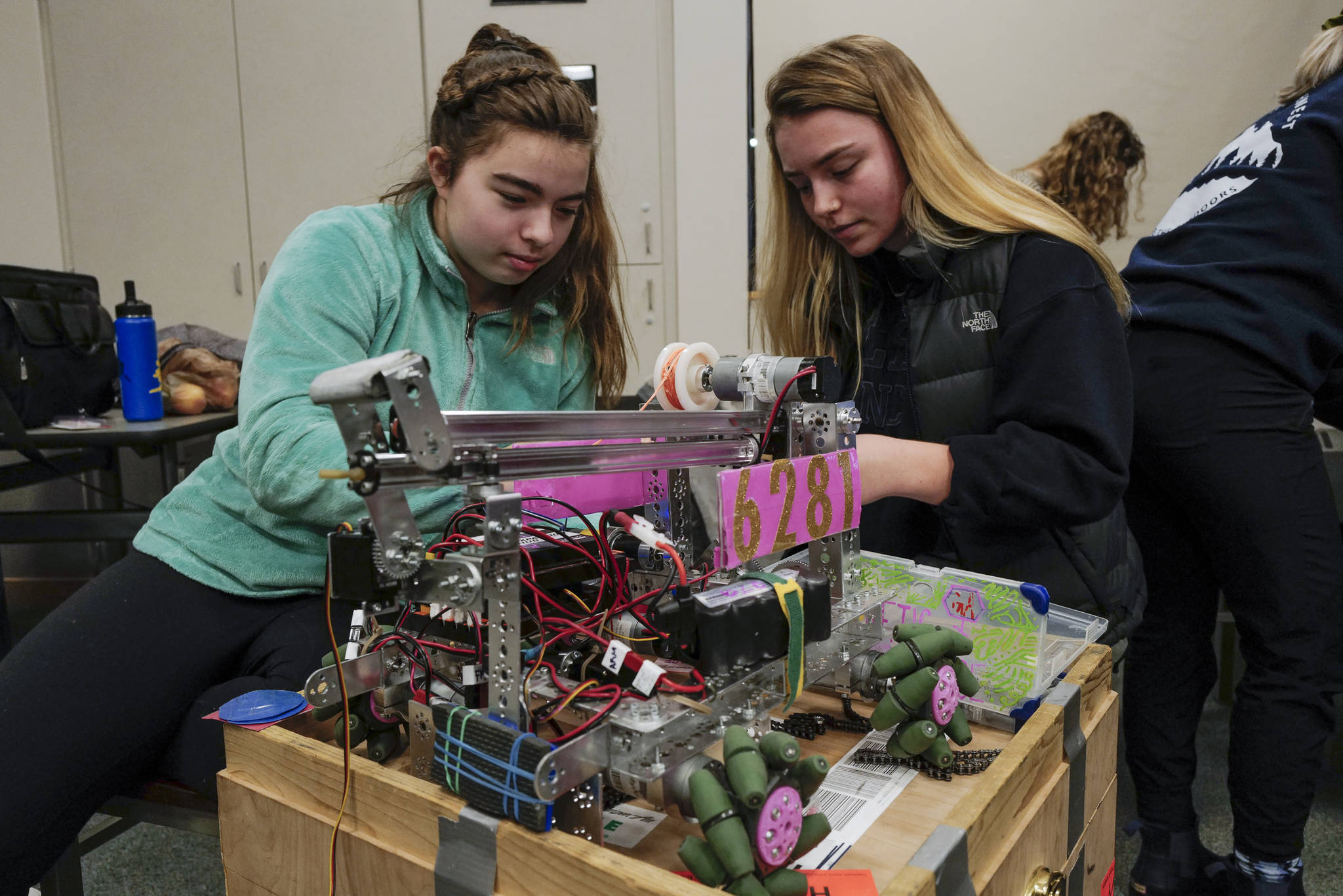The world of computer science is still relatively new for Ashling Cruz, a 17-year-old at Thunder Mountain High School.
But you wouldn’t know that by talking to the senior captain of Juneau’s all-girls robotics team, “Genetic Advantage.” A year after taking a computer science course, much of Cruz’s life now revolves around computer programming, from participating on the robotics team to her dreams after high school.
“Being able to program a robot — I think it’s just really cool,” Cruz said. “With programming, it’s like a language, it’s like learning a language and once you learn the biggest part of the language you could really do anything with it.”
Now in its 13th season, Thunder Mountain High School’s robotics program has grown to close to 30 members and provides a platform for students like Cruz to try out STEM (Science, Technology, Engineering, Mathematics) careers.
That was the basis for the creation of FIRST (For Inspiration and Recognition of Science and Technology), the nonprofit that comes up with the rules and games for robotics competitions. This year, high school students the world over are designing small vehicle robots capable of moving and piecing together large LEGO bricks.
“They really get to learn the engineering process. If they want to learn how to program, they can learn how to program,” TMHS coach Carol May said. “Some kids come in with absolutely no experience, and the first year they sort of observe and just kind of are there to help. But then the next year they take on more tasks. It’s a great team event.”
The TMHS robotics program was one of five Southeast programs that competed this weekend in the Southeast Regional Qualifier Tournament. The team that has the best robot and checks off several other boxes wins the top award, called the Inspire Award. There were a number of other awards handed out based solely on best notebook and community outreach and service. Find out who won at juneauempire.com.
Meet some of the members from two of TMHS’ four robotics teams.
Darin Tingey, builder on “Trial and Error”
Tingey got his start in robotics while in elementary school with FIRST Lego League, an experience that prepared him well for the high school team. Tingey was one of two freshmen on “Trial and Error,” the first Juneau high school robotics team to reach the world championships in April.
“It was a really great experience. We saw so many teams and their robots — our robot was definitely out of their league,” Tingey said. “We didn’t come close to any of them.”
The 15-year-old is competing again this season on “Trial and Error,” and played a big role in the construction of the team’s latest robot.
Ashling Cruz, captain and programmer on “Genetic Advantage”
Cruz said she’s been academically-driven ever since moving to the capital city from Nicaragua as a fifth-grader. She never thought about joining the robotics team until last year.
“It really was an impulsive decision,” she said.
She’s glad she pushed through the first season and stuck with the sport.
“As the season progressed, I was learning so much and I didn’t even realize how cool it was,” she said.
Cruz enrolled in an advanced computer science class this year. She hopes to create an app for Family Promise, a volunteer organization that provides housing for homeless families.
“I think it’s something that’s really important to learn and know about,” she said of computer science. “There’s just so many cool things that you can do with computer science. Like computer science is just the root. You can go into medical (fields), you could do law, you could do some many things with it.”
Teilhard Buzzell, main builder and captain on “Trial and Error”
Buzzell is another returner on “Trial and Error,” and likes the teamwork and problem-solving skills inherent to robotics.
“That communication and teamwork can help build (robots) and that’s kind of what drives me, the interactions with people and getting to know other teams and stuff,” he said.
He said it can get intense during competitions when two teams (or alliances) compete against two other teams in matches on a small enclosed arena or playing field.
“There’s a lot of moving parts since there’s four robots on the field and you and your alliance already have a game plan figured out,” Buzzell said. “But when you actually start you have no idea what the other team is doing. So that plan is always being revised, so you’re always thinking about what can you do that can benefit your alliance the most without damaging them.”
• Contact sports reporter Nolin Ainsworth at 523-2272 or nainsworth@juneauempire.com.

